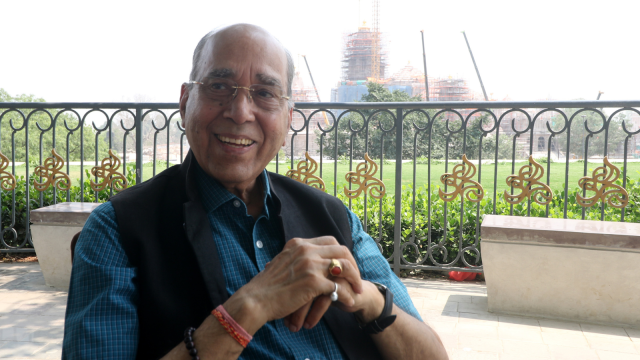
OBSERVING THAT there are “limits” to correcting historical wrongs, Nripendra Misra, Ayodhya Ram temple’s officer-architect-in-chief, has said that once people “realise that the time has gone by and once they realise the dream of the future while living in the present, society will be more positive and look towards the issues of development.”
Misra, who served as the Principal Secretary to Prime Minister Narendra Modi in his entire first term, and was appointed the Chairman of the temple construction committee in February 2020, also said the Ram Mandir “was accepted by all only because it was (a judgement) by the Supreme Court”, but one “cannot seek justice for the past” in all such conflicts.
Asked whether the completion of the Ram temple would encourage those who agitated for it to move on, or if more claims would arise for temples in different places, he said, “I place this responsibility not so much on the government. It will have to be of various social groups, representatives, elected or not elected – they must recognise. They have limits on correcting issues. We all know that the time which has gone does not come back. We do not keep it in clutches. Once they realise that the time has gone by and once they realise the dream of the future while living in the present, then society will be more positive, and will look towards the issues of development.”
“After all, there is another agenda. You and I are worried. There is 7% growth. Will I maintain it? I am going to be the third country in terms of economic power very soon. Why can’t I become number 2 or 1? China is always in our memory; that they are far ahead of us. If these are the challenges, we weaken society by disintegration. We should rather strengthen the society to divert this energy to development. In politics, there are different sets of opinions; sometimes you believe in it, sometimes you create. But they are all audible. Social leaders of my country have a great responsibility,” he said.
On what the country should focus on now that it’s on course to replace Japan as the fourth-largest economy, he said, “… we may have crossed (Japan) but they don’t have so many poor, they don’t have problems with proper nourishment. They don’t have problems with education and health. I may say that I produce maximum milk, but does everyone take milk? The answer is no. So, my target should not be that I am maximum (at these parameters). My target should be, am I giving each individual the gains of my growth? I put health, wellness, hospitals at number 1, education at number 2, and third and most important, is empowering rural women. My agenda will be to achieve these goals.”
Asked about instances like the Jama Masjid row in Sambhal, where a local court had granted permission for a survey in November last year, leading to clashes between protesters and the police, he said, “It’s a problem. Certain issues are in some manner localised. I always say the judgment on the Ram temple was accepted by all only because it was by the Supreme Court. Everything got normalised. Everyone was then following daily routines. We cannot seek justice for the past. It has to be forgotten.”